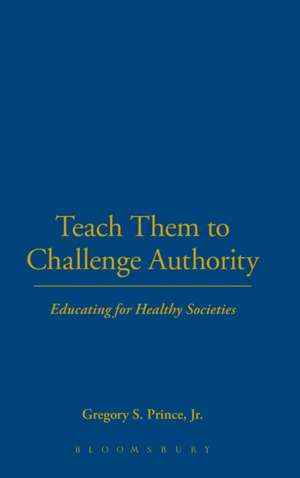Teach Them to Challenge Authority: Educating for Healthy Societies
Autor Gregory S. Prince, Jr.en Limba Engleză Hardback – 14 iun 2008
From the Author's Introduction:
Many conservatives argue the liberal bias of faculty in the United States is compromising the ability of universities to teach the art of critical thinking, which is so essential to challenging conventional wisdom and even challenging authority. They argue that the proper role of the liberal arts faculty and university is to maintain an institutional posture of neutrality in the face of major intellectual and social issues and, having laid out the main arguments about an issue, leave it up to the students to make up their own minds. If these advocates of "neutralism"-in and of itself a non-neutral position-succeed in transforming universities into neutral institutions, they will undermine the critical thinking they seek to support. They will damage the very character of US education that the rest of the world so admires and increasingly attempts to emulate-its capacity to encourage creativity and risk taking and to produce students who have the courage to challenge authority and convention in appropriate and constructive ways... To silence the university is to silence the citizenry. Our country and the world require from educational institutions commitment, engagement, and action, not neutrality.
Teach Them to Challenge Authority gets to the heart of what education should really be about. Drawing on decades of experience, Gregory S. Prince Jr. moves seamlessly between his experience as President of Hampshire college and the broader, bigger picture made up of national and international issues. He demonstrates that the debate between those who favor "neutral" universities and those who favor "engaged" ones could have radical consequences-not just for the world of education, but for society as a whole.
Preț: 227.43 lei
Preț vechi: 349.64 lei
-35% Nou
Puncte Express: 341
Preț estimativ în valută:
43.52€ • 45.44$ • 36.02£
43.52€ • 45.44$ • 36.02£
Carte tipărită la comandă
Livrare economică 04-18 aprilie
Preluare comenzi: 021 569.72.76
Specificații
ISBN-13: 9780826491381
ISBN-10: 0826491383
Pagini: 256
Dimensiuni: 159 x 227 x 25 mm
Greutate: 0.5 kg
Editura: Bloomsbury Publishing
Colecția Continuum
Locul publicării:New York, United States
ISBN-10: 0826491383
Pagini: 256
Dimensiuni: 159 x 227 x 25 mm
Greutate: 0.5 kg
Editura: Bloomsbury Publishing
Colecția Continuum
Locul publicării:New York, United States
Caracteristici
Highly respected author and educator Greg Prince offers decades of experience moving seamlessly between his time as President of Hampshire College before presenting the national and international issues associated with his ideas.
Cuprins
Introduction
Part I: Two View of Education
Engagement versus Neutrality
Engagement versus Neutrality
Protecting or Liberating Students
Part II: Mirrors for America: Looking Abroad
The University of Natal: Modelling Behaviour We Expect of Students
The European Humanities University: Challenging Authority
The Asian University for Women: Living Up to Expectations
Singapore Management University: Teaching Critical Thinking The American University in Bulgaria: Speaking to Authority
Part III: What Education Should be About
The Engaged University
Listening to Students
Part II: Mirrors for America: Looking Abroad
The University of Natal: Modelling Behaviour We Expect of Students
The European Humanities University: Challenging Authority
The Asian University for Women: Living Up to Expectations
Singapore Management University: Teaching Critical Thinking The American University in Bulgaria: Speaking to Authority
Part III: What Education Should be About
The Engaged University
Listening to Students
Recenzii
The first intelligent book written about what the educational process has the capacity to accomplish. Andrew Sigler, former CEO of Champion International and former member of the Board of Trustees of Dartmouth College
During a lifetime in higher education Gregory Prince has learned that exceptional universities in America and abroad refuse to be neutral about the great moral issues of their time. Students deserve and demand that their institutions be as brave as they are. Mr. Prince certainly is, as he cogently and courageously presents the case for colleges to be involved in their communities and their country. He takes us to Africa, Australia and Europe to provide inspiring examples of how students and educators can respect and motivate each other to improve their societies. You can't put this book down, and you won't. --Paul Gambaccini, BBC Radio
Prince's message is of particular relevance in today's fractured and dangerous world....Education is a fundamental force in the historical evolution of civilization in its broadest sense, encompassing a plethora of cultures and societies. This book is essential reading for educators at university level and of great benefit to the general reader concerned with the role of education in our changing society. --Iqbal Riza, former Chief of Staff to the Secretary-General of the United Nations
Amongst the many books on the rights and wrongs of higher education each year, occasionally one appears with the power to truly transform the landscape and all those who learn, labor, lead and live within it. Such is the book, Teach Them to Challenge Authority: Educating for Healthy Societies by Gregory Prince. He builds on a traditional foundation of liberal learning in educating for critical thinking and the spirit of inquiry, expanding its role to meet the challenges of the 21st century by advocating for important global issues, such as civil liberties - even when these impinge on controversial issues such as reproductive rights - and social justice....Gregory Prince shows the path ahead with clarity, elegance and with ideas and writing that will move anyone who reads this book. -- David K. Scott, Chancellor Emeritus, University of Massachusetts Amherst
Teach Them to Challenge Authority offers a cogent, thoughtful treatise on the value of engaged education in terms of cortical thinking skills and other benefits....In short, this book should be read and discussed by students, faculty, and administrators who are seeking more than buzzwords about engagement and want to dig deeper in to the rationale for an engaged, activist academy populated by different types of institutions.
During a lifetime in higher education Gregory Prince has learned that exceptional universities in America and abroad refuse to be neutral about the great moral issues of their time. Students deserve and demand that their institutions be as brave as they are. Mr. Prince certainly is, as he cogently and courageously presents the case for colleges to be involved in their communities and their country. He takes us to Africa, Australia and Europe to provide inspiring examples of how students and educators can respect and motivate each other to improve their societies. You can't put this book down, and you won't. --Paul Gambaccini, BBC Radio
Prince's message is of particular relevance in today's fractured and dangerous world....Education is a fundamental force in the historical evolution of civilization in its broadest sense, encompassing a plethora of cultures and societies. This book is essential reading for educators at university level and of great benefit to the general reader concerned with the role of education in our changing society. --Iqbal Riza, former Chief of Staff to the Secretary-General of the United Nations
Amongst the many books on the rights and wrongs of higher education each year, occasionally one appears with the power to truly transform the landscape and all those who learn, labor, lead and live within it. Such is the book, Teach Them to Challenge Authority: Educating for Healthy Societies by Gregory Prince. He builds on a traditional foundation of liberal learning in educating for critical thinking and the spirit of inquiry, expanding its role to meet the challenges of the 21st century by advocating for important global issues, such as civil liberties - even when these impinge on controversial issues such as reproductive rights - and social justice....Gregory Prince shows the path ahead with clarity, elegance and with ideas and writing that will move anyone who reads this book. -- David K. Scott, Chancellor Emeritus, University of Massachusetts Amherst
Teach Them to Challenge Authority offers a cogent, thoughtful treatise on the value of engaged education in terms of cortical thinking skills and other benefits....In short, this book should be read and discussed by students, faculty, and administrators who are seeking more than buzzwords about engagement and want to dig deeper in to the rationale for an engaged, activist academy populated by different types of institutions.
Descriere
Eminent educator Greg Prince examines how colleges should set an example of behaviour to students in order to maximise their success. The author investigates both the national and international implications and reveals how these simple measures will revitalise not only the world of education but also wider society.












